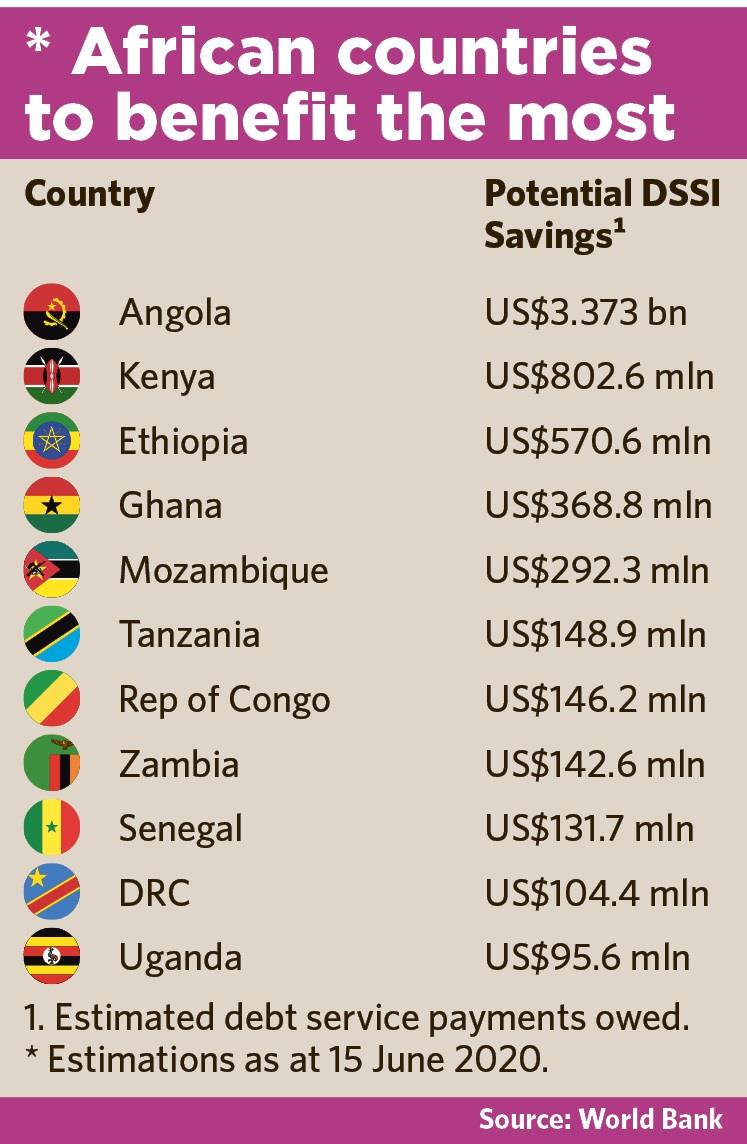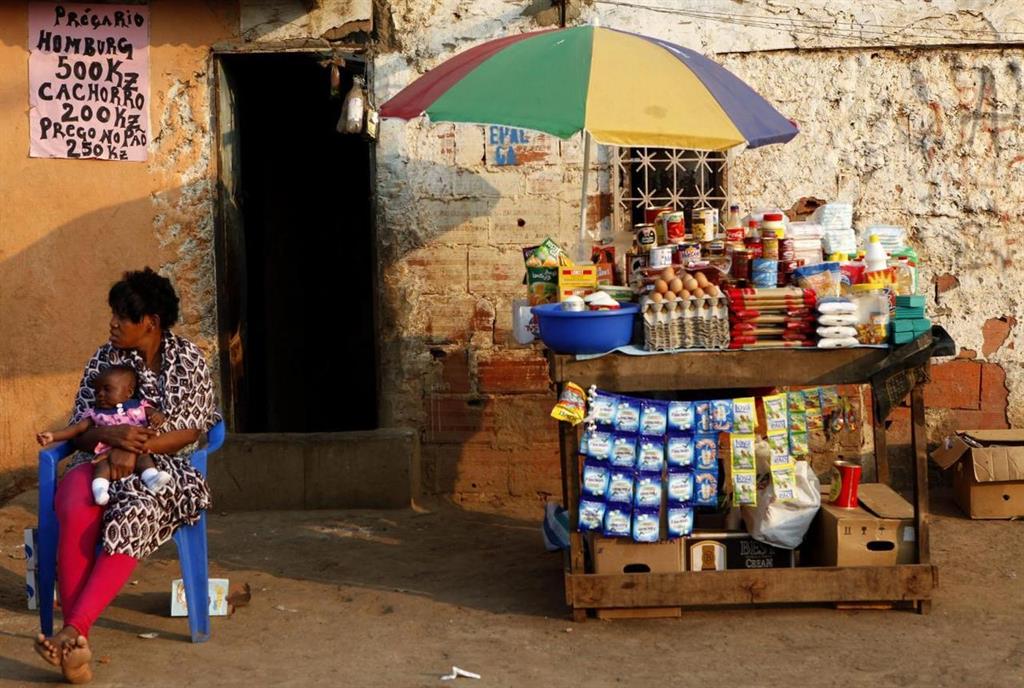Poorest countries to save billions in debt relief
The World Bank has called for transparency of all government financial commitments and investments.
The world's poorest countries could save over US$12 billion owed to sovereign and other creditors this year through their participation in a debt-relief programme, with Angola alone saving some US$3.4 billion, according to estimates published in a new database from the World Bank.
Approached for comment on Namibia’s need for debt relief, the chief public relations officer of the ministry of finance, Tonateni Shidhudhu, said: “We are in good standing to honour our debt obligations, and our intention is to continue honouring that obligation.”
In his budget tabled late in May, finance minister Iipumbu Shiimi included an amount of about N$4.8 billion as “other funding requirements” in his budget for 2020/21.
This consists of about N$1.6 billion in bond redemption, as well as N$2.89 billion in an overdraft facility at the Bank of Namibia (BoN). Foreign debt payments for the current fiscal year are estimated at N$330 million.
Deficit, debt
Namibia’s budget deficit of N$21.4 billion – equivalent of 12.5% of gross domestic product (GDP) – is the largest in the country’s history.
“To put into perspective, the magnitude of the current deficit is 1.7 times larger than what was recorded back in 2015/16, the previous largest deficit in Namibia,” Cirrus Securities says in their analysis of the 2020/21 budget.
The deficit has pushed up Namibia’s total debt burden by N$22.2 billion to N$119.1 billion in the current fiscal year.
“Although the budget deficit is the largest in Namibia’s independent history, the increase in debt is only the second largest with the N$24.6 billion issued in 2015/16, when the second Eurobond was placed,” Cirrus said.
Debt Service Suspension Initiative
The president of the World Bank Group, David Malpass, said the Debt Service Suspension Initiative (DSSI) database “is only start”.
Namibia, regarded by the World Bank as an upper-middle-income country, is not currently included. Only low-income countries’ debt data is currently captured.
“Going forward, borrowing countries and creditors need to achieve sustained progress on five key principles to improve debt transparency and improve investment flows,” Malpass said.
These principles are:
Spell out loan contract terms and payment schedules;
Full disclosure of the stock of public and publicly guaranteed debt, SOE liabilities, and debt-like instruments;
Enable borrowers to seek relief from excessive confidentiality clauses so they can proceed with more transparent data reporting;
Promote effective and prudent use of collateral and liens in sovereign borrowing; and
Insist that borrowers and lenders avoid violations of legal requirements of other creditors, such as negative pledge clauses.
“The transparency of all government financial commitments and investments is a key step in creating an attractive investment climate and could make substantial progress this year to deliver better outcomes for people in developing countries,” Malpass added.
Short term
The savings under the Covid-19-linked Debt Service Suspension Initiative (DSSI) will be short term, since the initiative only provides for suspension of debt payments through the end of the year. It postpones those payments until a later date but does not cancel them outright.
The second-largest saver among eligible DSSI countries would be Pakistan, with US$2.4 billion, followed by Kenya with US$802 million, according to the data.
In terms of savings compared with gross domestic product, Bhutan would reap the most benefits from the plan with 7.3% of GDP savings, followed by Angola at 3.7% and Djibouti at 2.5%.
Besides each country's estimated savings, the database includes details on debt owed to multilaterals like the International Monetary Fund as well as on official and non-official bilateral debt disbursed and debt service due per year.
“I believe it is important to have detailed and timely public disclosure of debt service payments that may be deferred,” said the president of the World Bank Group, David Malpass.
“This will enable stakeholders—governments as well as the private sector and the public at large—to keep track of the progress being made in the implementation of DSSI while highlighting the growing importance of debt transparency,” Malpass said.
Transparency
IMF and World Bank officials have warned that the Covid-19 pandemic will hit developing and emerging markets particularly hard given high levels of debt, sharp drops in oil and other commodity prices and insufficient healthcare systems.
The DSSI is backed by the G-20, the World Bank, the IMF and the Paris Club of sovereign lenders.
The database provides a new level of transparency about debts and creditors, including China, which has become one of the largest creditors in Africa and elsewhere over the past two decades.
The Jubilee Debt campaign has estimated the cancellation of poor countries’ debt payments, including to private creditors, would free over US$25 billion for the countries this year, or US$50 billion if extended through 2021.
The United Nations, many African countries and civil society groups have called for the debt relief to be extended for two years to allow countries to recover more fully from the economic shock of the pandemic. - Own report, World Bank and Nampa/Reuters
Approached for comment on Namibia’s need for debt relief, the chief public relations officer of the ministry of finance, Tonateni Shidhudhu, said: “We are in good standing to honour our debt obligations, and our intention is to continue honouring that obligation.”
In his budget tabled late in May, finance minister Iipumbu Shiimi included an amount of about N$4.8 billion as “other funding requirements” in his budget for 2020/21.
This consists of about N$1.6 billion in bond redemption, as well as N$2.89 billion in an overdraft facility at the Bank of Namibia (BoN). Foreign debt payments for the current fiscal year are estimated at N$330 million.
Deficit, debt
Namibia’s budget deficit of N$21.4 billion – equivalent of 12.5% of gross domestic product (GDP) – is the largest in the country’s history.
“To put into perspective, the magnitude of the current deficit is 1.7 times larger than what was recorded back in 2015/16, the previous largest deficit in Namibia,” Cirrus Securities says in their analysis of the 2020/21 budget.
The deficit has pushed up Namibia’s total debt burden by N$22.2 billion to N$119.1 billion in the current fiscal year.
“Although the budget deficit is the largest in Namibia’s independent history, the increase in debt is only the second largest with the N$24.6 billion issued in 2015/16, when the second Eurobond was placed,” Cirrus said.
Debt Service Suspension Initiative
The president of the World Bank Group, David Malpass, said the Debt Service Suspension Initiative (DSSI) database “is only start”.
Namibia, regarded by the World Bank as an upper-middle-income country, is not currently included. Only low-income countries’ debt data is currently captured.
“Going forward, borrowing countries and creditors need to achieve sustained progress on five key principles to improve debt transparency and improve investment flows,” Malpass said.
These principles are:
Spell out loan contract terms and payment schedules;
Full disclosure of the stock of public and publicly guaranteed debt, SOE liabilities, and debt-like instruments;
Enable borrowers to seek relief from excessive confidentiality clauses so they can proceed with more transparent data reporting;
Promote effective and prudent use of collateral and liens in sovereign borrowing; and
Insist that borrowers and lenders avoid violations of legal requirements of other creditors, such as negative pledge clauses.
“The transparency of all government financial commitments and investments is a key step in creating an attractive investment climate and could make substantial progress this year to deliver better outcomes for people in developing countries,” Malpass added.
Short term
The savings under the Covid-19-linked Debt Service Suspension Initiative (DSSI) will be short term, since the initiative only provides for suspension of debt payments through the end of the year. It postpones those payments until a later date but does not cancel them outright.
The second-largest saver among eligible DSSI countries would be Pakistan, with US$2.4 billion, followed by Kenya with US$802 million, according to the data.
In terms of savings compared with gross domestic product, Bhutan would reap the most benefits from the plan with 7.3% of GDP savings, followed by Angola at 3.7% and Djibouti at 2.5%.
Besides each country's estimated savings, the database includes details on debt owed to multilaterals like the International Monetary Fund as well as on official and non-official bilateral debt disbursed and debt service due per year.
“I believe it is important to have detailed and timely public disclosure of debt service payments that may be deferred,” said the president of the World Bank Group, David Malpass.
“This will enable stakeholders—governments as well as the private sector and the public at large—to keep track of the progress being made in the implementation of DSSI while highlighting the growing importance of debt transparency,” Malpass said.
Transparency
IMF and World Bank officials have warned that the Covid-19 pandemic will hit developing and emerging markets particularly hard given high levels of debt, sharp drops in oil and other commodity prices and insufficient healthcare systems.
The DSSI is backed by the G-20, the World Bank, the IMF and the Paris Club of sovereign lenders.
The database provides a new level of transparency about debts and creditors, including China, which has become one of the largest creditors in Africa and elsewhere over the past two decades.
The Jubilee Debt campaign has estimated the cancellation of poor countries’ debt payments, including to private creditors, would free over US$25 billion for the countries this year, or US$50 billion if extended through 2021.
The United Nations, many African countries and civil society groups have called for the debt relief to be extended for two years to allow countries to recover more fully from the economic shock of the pandemic. - Own report, World Bank and Nampa/Reuters






Kommentar
Allgemeine Zeitung
Zu diesem Artikel wurden keine Kommentare hinterlassen